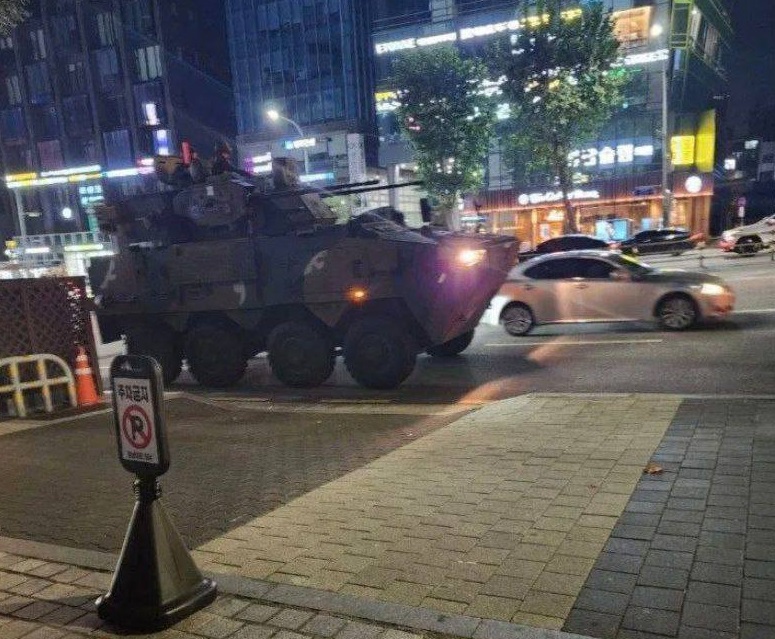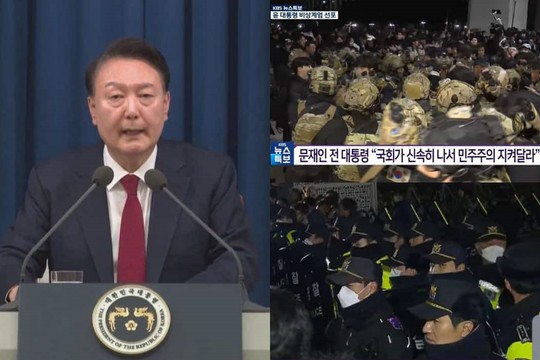South Korean President Yoon Suk Yeol declares Martial law
Photo: yesasia
South Korea's parliament has voted to lift martial law in the country, the speaker of the parliament, Woo Won-shik, said on Tuesday, Sputnik Globe informs.
All 190 lawmakers present voted in favor of the repeal. There are a total of 300 lawmakers in the parliament.
Won-shik's office said the president's declaration of martial law was invalid following the lawmakers' vote.
The speaker has also urged the president to immediately lift martial law.
Earlier, the country's President Yoon Suk Yeol declared emergency martial law in a live televised address to the nation.
The president held an emergency meeting in his office overnight, after which he announced the imminent paralysis of power due to attempts to impeach him, according to the Yonhap news agency.
The commander of the martial law in South Korea, Park An-su, announced the suspension of the work of the parliament and political parties.
"The activities of the National Assembly and local legislative assemblies, as well as political parties, political gatherings, rallies, demonstrations and other political activities are completely prohibited," the Decree No. 1 of the Martial Law Command, which was signed by General of the Army of the Republic of Korea Army Park An-su, read.
The commander of the martial law in South Korea also said that control over all media outlets is being introduced in the country.
The South Korean Defense Ministry has ordered commanders of all military branches to increase combat readiness.
The commander of the martial law in South Korea has announced the suspension of parliament and political parties. Additionally, he declared the imposition of control over all media outlets following the suspension of parliament and political parties in the country.
Footage has emerged online showing South Korean Armed Forces entering the country's Parliament.
The troops of the martial law command are trying to enter the parliament building, and the main entrance to the National Assembly is blocked, and barricades are being installed, according to Yonhap.
The South Korean military said it has been fighting "anti-state" forces. The defense ministry has ordered the army to be ready to repel emergency situations, reserve soldiers to go on duty, media reports say.
Videos from social media show clashes taking place near the parliament's building.
President Yoon has lifted martial law and his cabinet approved the action. Protests are still continuing and it seems the army and police have pulled back. Meanwhile the head of Yoon’s party says that Yoon made his decision on the advice of the Minister of Defense and he is calling for the Minister’s resignation.
“As the ruling party, we feel deeply sorry to the public,” People Power Party leader Han Dong-hoon said in a statement to reporters early on Wednesday morning local time.
“The president must directly and thoroughly explain this tragic situation,” he added. “The minister of defense, who recommended this martial law, should be immediately dismissed, and all those responsible must be held strictly accountable.”
This is not the end of the crisis.
Korean President's martial law decree was rescinded by the Korean parliament, whose members voted despite the incursion of combat troops trying to break into meeting rooms in the parliament building.
After lawmakers unanimously voted to block the president’s martial law decree, dozens of troops that had entered the main parliamentary building began to withdraw, according to Korean newspaper Chosun Ilbo.
 Military equipment on the streets of Seoul.
Military equipment on the streets of Seoul.
Photo from social media
The decision of the South Korean president was a disaster for Korea and also for the United States. Mr. Yoon's reckless declaration has imperiled the country and severely risked the alliance with the United States, writes Stephen Bryen is a former US Deputy Under Secretary of Defense.
The United States keeps a large military force in Korea based on a mutual defense treaty.
The US has 28,500 US troops in Korea, predominantly Army, the majority of them at Camp Humphreys, the largest US overseas base in the world. In addition there is U.S. Army Garrison Daegu and Camp Casey, near the DMZ.
The US Air Force operates at Kunsan Air Base and Osan Air Base. Kunsan Air Base is the home of the 8th Fighter Wing, "The Wolf Pack," assigned to the Pacific Air Forces' Seventh Air Force and the 38th Fighter Group of the Republic of Korea Air Force. Osan Air Base, located 48 miles south of the Korean DMZ, is home to the "Mustangs" 51st Fighter Wing and 24 tenant units, including Seventh Air Force. As the most forward deployed permanently-based wing in the Air Force, the 51st Fighter Wing is charged with providing mission-ready Airmen to execute combat operations and receive follow-on forces.
Since 2016 the US has deployed a Terminal High Altitude Area Defense (THAAD) system in Korea as part of the US ballistic missile defense system.
The Biden administration, at least so far, has said very little, probably trying to work in the background in the early stages of the Korean President's announcement. But Washington cannot sit idly by and hope for the best.
If the Korean army obeys the parliamentary decree, as they appear to have done by retreating from the parliament building, that's a hopeful sign. But the army and police also can't suppress protests using violence as a political tool, as they have been doing. Should the Korean army continue in this mode it will lose its credibility at home and force the US into a divorce it does not want.
The internal political situation in South Korea is now almost beyond salvation. It remains to be seen if common sense will replace recklessness.
read more in our Telegram-channel https://t.me/The_International_Affairs

 12:02 04.12.2024 •
12:02 04.12.2024 •























